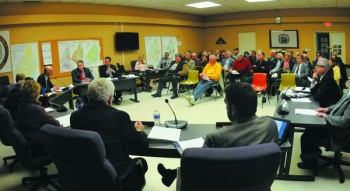
The Jefferson County Commission met with members of the West Virginia Legislature and representatives from the horse racing and breeding industry Thursday evening to discuss the future of live thoroughbred horse racing in Jefferson County, as well as the state as a whole.
CHARLES TOWN, W.Va. – The Jefferson County Commission met with members of the West Virginia Legislature and representatives from the horse racing and breeding industry Thursday evening to discuss the future of live thoroughbred horse racing in Jefferson County, as well as the state as a whole.
According to Dr. Doug Allara, president of the West Virginia Thoroughbred Breeders Association, a 2013 economic impact study of the greyhound and thoroughbred racing industries in West Virgina showed that racing contributed more than $321 million to West Virginia’s economy in 2012.
According to the study, racing provided 7,300 West Virginians with jobs in 2012, including 2,400 people who were employed in thoroughbred racing activities in Jefferson County, Allara said.
“Other parts of the state praise King Coal, but our legacy is horse racing,” Allara said. “We should be proud of our racing and breeding and help preserve it.”
In addition to Allara, speakers in the roundtable discussion were Sen. Herb Snyder, D-Jefferson; Delegate Stephen Skinner, D-Jefferson; Delegate Paul Espinosa, R-Jefferson; and lobbyist Phil Real, representing the Charles Town Horsemen’s Benevolent Protective Association.
Real said the business model of horse racing in Jefferson County is one that came from state statutes that allow racetracks to develop casino gaming, in addition to giving voters a referendum to permit racing in their community.
“West Virginia faces a difficult budget session in the legislature,” Real said. “The gaming industry is facing competition and generating less revenues in the state, and there’s been a decline in coal revenues.”
Real said that many factors would have to be considered at the state level before racing could be altogether eliminated in West Virginia, including the thousands of people who would be without jobs and the negative impact on the state’s economy, especially from tourism revenue.
“There was a study that said Jefferson County was No. 1 in the state for tourism dollars-by a lot,” he said. “It’s no coincidence that the other counties that lead the state in tourism have live racing and casino gaming.”
According to an economic impact study from the West Virginia Division of Tourism, tourists spent $959 million in Jefferson County in 2012. Kanawha County ranked second with $649 million in tourist spending.
Espinosa said the topic of horse racing may be approached differently by the new group of legislators in the state’s capital, and said the legislators can be educated about the importance of racing in West Virginia.
Snyder said the so-called “Haircut Bill,” which would take 10 percent of gaming revenue from racing, proposed during the last legislative session, was sprung on the legislators and they did not know about the bill ahead of time.
“We don’t know if there’s anything up their sleeve this time or not,” he said.
According to Skinner, racing revenue may be seen as a place for the state government to find money as the state faces a budget shortfall this year.
“When the state has a budget shortfall, pledges to cut taxes and pledges to stop dipping into the rainy day fund, people start looking for money wherever they can,” Skinner said. “That $80 million (from gaming revenue) starts to look very attractive.”
Skinner urged those who attended the meeting to “speak with a unified voice,” a point that Jefferson County commissioners echoed in their comments.
Commission president Jane Tabb asked the group how the issue of racing could best be presented to the new leaders in the legislature.
Real suggested keeping the focus on the economic impact racing has on the state’s economy and racing’s legacy in the Eastern Panhandle, and presenting the issue as one related to agriculture and tourism rather than gaming.
“We do have a dramatic change in legislative leadership, and whenever there’s a change, you look forward instead of behind you,” Real said. “We need to find where the opportunities are.”
The county commissioners may draft a resolution, to be presented to members of the legislature, at a future county commission meeting.





